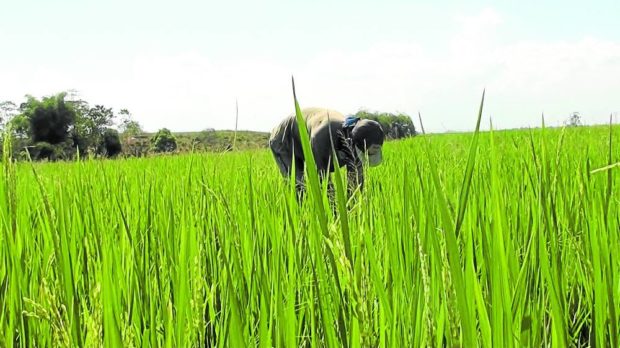
(VILLAMOR VISAYA JR. / INQUIRER file photo)
MANILA, Philippines — President Ferdinand “Bongbong” Marcos Jr. has ordered the geomapping of all agricultural lands in the country to increase the yield and improve farmers’ income.
According to the Presidential Communications Office (PCO) on Thursday, Marcos issued the order to determine soil maps for specific agricultural products during a meeting with the Philippine Rice Industry Stakeholders Movement (PRISM) in Malacañang on Wednesday.
Marcos said the government is already using geomapping to resolve titling issues to boost agricultural production and increase farmers’ income.
“Iyong sa geomapping, actually ginagamit na namin ang mapa ng BIR (Bureau of Internal Revenue) at saka NAMRIA (National Mapping and Resource Information Authority). We are putting together everything kasi mahirap naman ipa-survey lahat. So, para alam na natin ‘yung mga areas and it started also with irrigation, sa NIA (National Irrigation Authority),” Marcos said in the meeting, as quoted by the PCO.
(We use the maps of BIR and NAMRIA for the geomapping. We are putting together everything because it’s difficult to survey all. So that’s how we will know the areas, and it also started with irrigation.)
“So from that, ‘yung titling problem na sinasabi natin, magiging mas madali. But at least ma-define na natin ‘yung mga parcels of land and, in that way, alam na natin. So, kung maalis na natin ang titling problem, mas madali na lahat,” he added.
(From that, the tilting problem will be easier to address. We will at least define the parcels of land, and we will know. If we can solve the tilting problem, everything will be fine.)
The PCO said geomapping “is the process of converting raw data from surveys into a geomap that helps by providing a visualization of the location of utilities quickly and accurately.”
During the meeting, PRISM raised several concerns, many of which could readily be addressed by government interventions and programs.
Among these concerns is the high cost of rice production, limited market access, limited access to capital investment, adverse BIR policies, lack of extensive irrigation system and climate crisis-El Niño threat, and slow adoption of vital rice production technology.
Unavailability and lack of access to real-time data, misaligned programs and activities across agri-related government agencies, inconsistent consultative meetings among the various rice stakeholders, and rice smuggling were among the identified roadblocks to higher productivity.
The PCO said existing government interventions addressing these concerns include the implementation of the Farm and Fisheries Consolidation and Clustering program (F2C2), the provision of various support services, including credit and financing by the DA and the Land Bank of the Philippines, and the establishment of climate-smart agriculture infrastructure.
The government is also formulating the National Agricultural and Fisheries Modernization and Industrialization Plan and other plans to guide the development of the agriculture and fisheries sectors in consultation with other stakeholders.
It also utilizes information technology to gather, analyze, and use data for food production, such as the Smarter Approaches to Reinvigorate Agriculture as an Industry in the Philippines or SARAI. It has been conducting regular meetings conducted by the National Convergence Initiative for Sustainable Rural Development.
The PCO said recalibration of the importation schedule is also being carried out to protect local farmers and industries.
Also being studied are the requirements of the proposed pre-shipment inspection system by the Department of Finance (DOF), DA, and other government agencies, and the DA is also conducting a review of the Rice Tariffication Law (RTL) and its implementing rules and regulations (IRR).
Clustering, low soil fertility, mill modernization and improved milling process were also discussed during the Palace meeting, the PCO said.
PRISM, founded in 2019, comprises multisectoral groups in the rice industry value chain.
READ:
Bill condoning farmers’ loan will boost agri production – lawmakers
Bongbong Marcos calls for improved agri production, less importation

